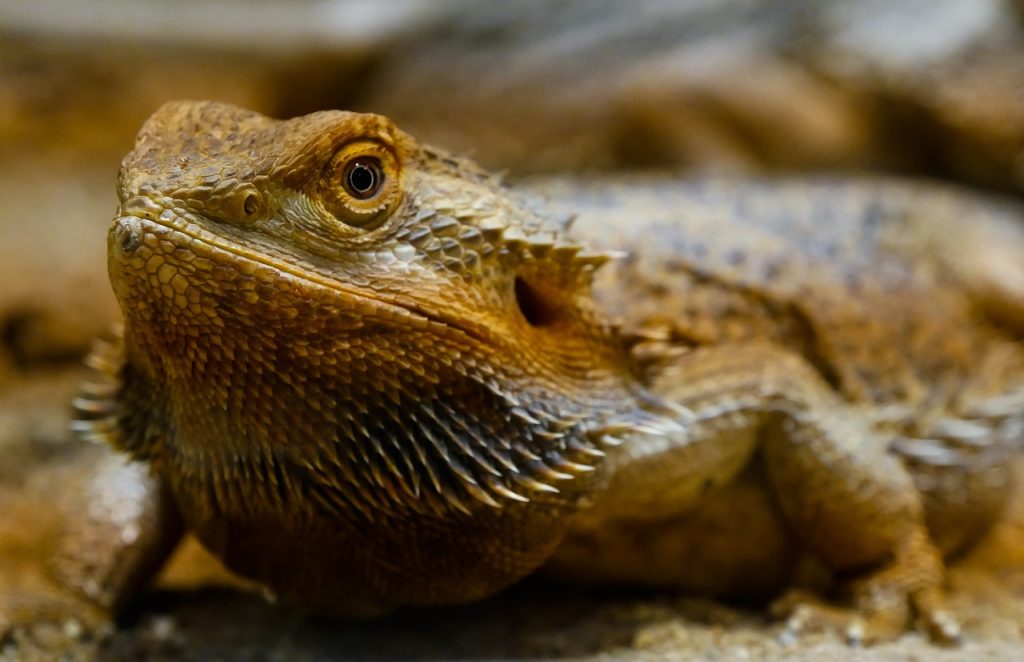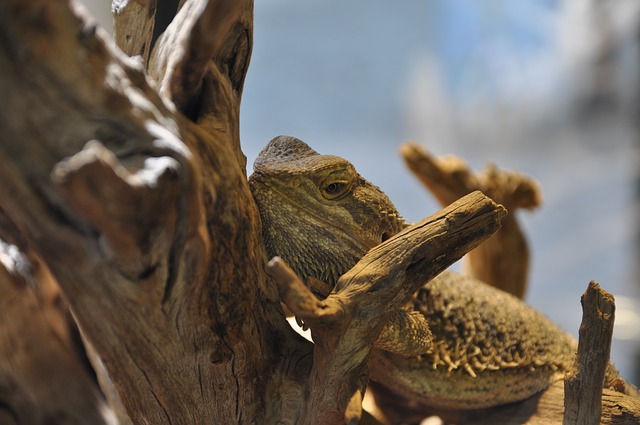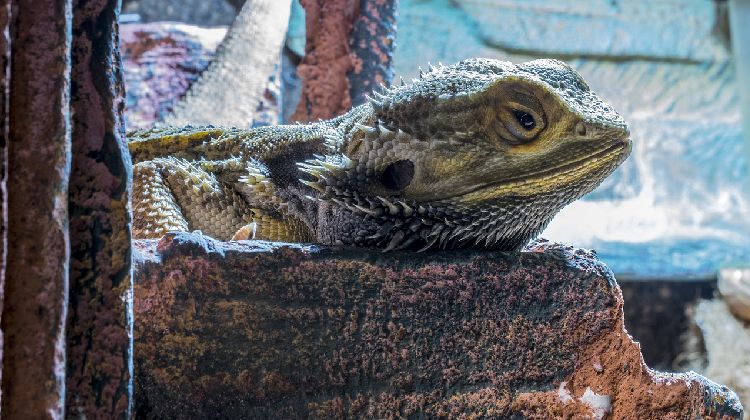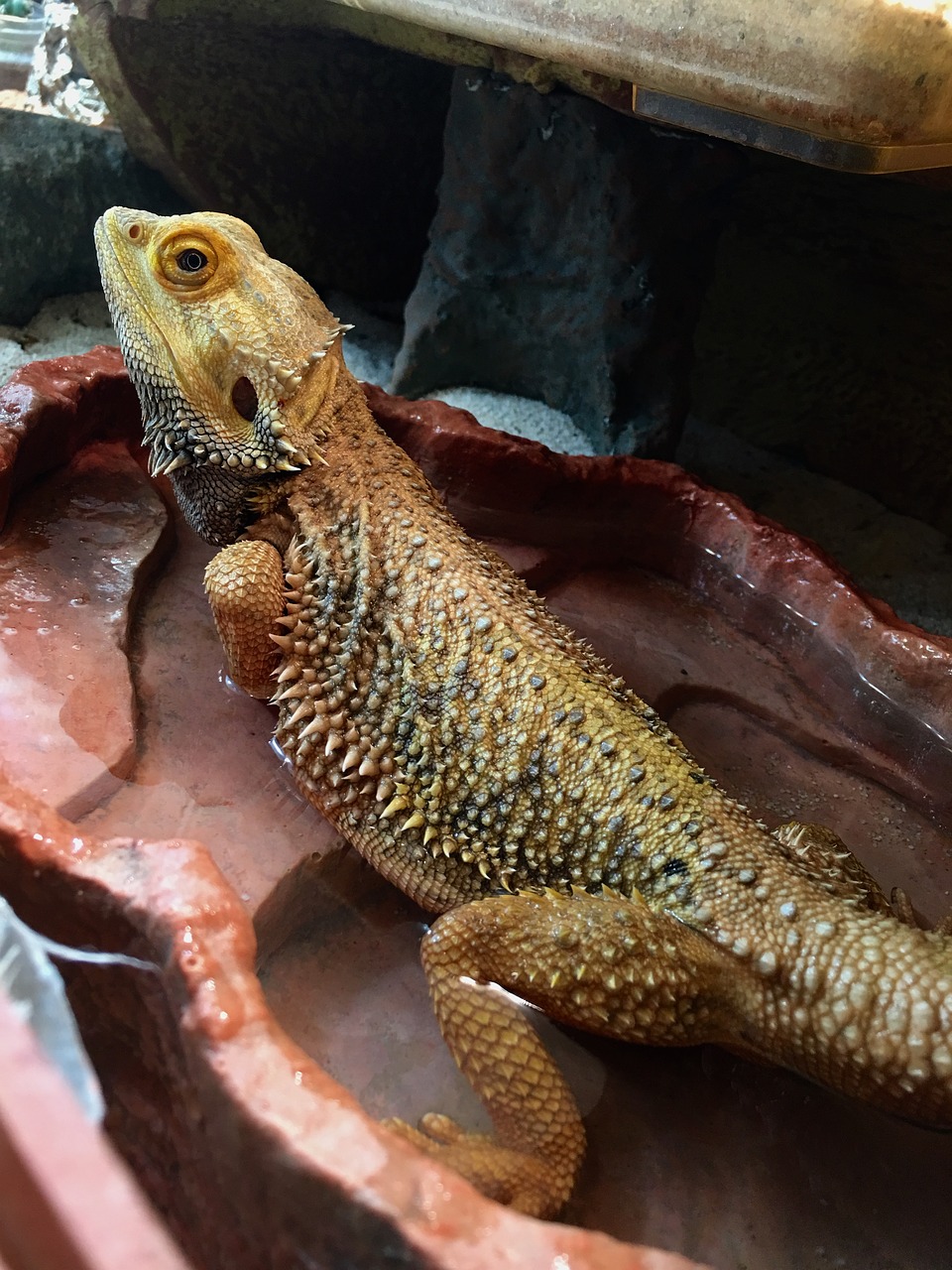Owning a bearded dragon is a joy — they’re friendly and docile, making them fantastic pets. However, there is one aspect of owning bearded dragons (commonly called beardies) that can be intimidating: brumation.
But what is Brumation?
Brumation is basically the reptilian version of hibernation.

Not every bearded dragon will undergo brumation, but for those that do, it can be a bit stressful for their owners.
In an effort to alleviate some of that stress, we have created this guide, in which we explain what brumation is, what to expect from it, and how you can help your bearded dragon through the brumation process.
We also make note of some common misconceptions and some health issues that are commonly confused for brumation due to similar symptoms.
It is important to note that brumation is nothing to be scared of! It’s a natural part of the life cycle of the bearded dragon.
In the wild, brumation allows the bearded dragon to more easily survive the winter, when temperatures drop and food is less plentiful. While that isn’t an issue for domestic bearded dragons, long years and many generations of evolution is hard to overcome.
By adjusting their living environment to mimic the season in which they’d be bruminating in the wild and checking in on them to ensure their health throughout the process, you can help make the brumation process a painless one for both you and your pet.
Read on to learn more about brumation in bearded dragons, how to recognize it, and how to help your pet through it.

Quick Navigation
Bearded Dragon Brumation
Brumation is a word that can still send a shiver of apprehension down the spine of even the most seasoned bearded dragon owners, and it’s understandable why this is so.
The lethargy, lack of appetite, and inactivity so commonly associated with Brumation can all also be signs of much more serious and potentially life threatening conditions.
It is because of this that it is so vital that bearded dragon (beardie) owners know the signs of brumation, so they can help to keep their beloved bearded dragon as happy and healthy as possible.
In this complete guide, we go through everything you need to know about bearded dragon brumation – what causes it, the common symptoms, common misconceptions and misdiagnosis, what to do, and how to reduce the likelihood of it happening in the future.
A Brief Look at the Beardie
While many of you reading this will be knowledgeable in bearded dragons already, there may also be some of you looking to buy a beardie, so for clarity we’ll first be taking a quick look at the bearded dragon in general.
Lovingly referred to as bearded dragons or ‘beardies’ for short, this reptile’s actual name is ‘Pogona’, or Pogona Vitticeps in Latin.
The bearded dragon is one of the most common lizards kept as pets, alongside the gecko, due it’s friendly disposition.
Typically bearded dragons are very docile and actually enjoy interaction and handling, making them a great alternative option for a family pet.
In terms of life span, bearded dragons typically live for between ten and fifteen years, and when fully grown are around 18 inches in length.
Like all members of the lizard family, bearded dragons are cold-blooded. This means its temperature is reactive to its environment.
If the room your bearded dragon is housed in is cold, then your dragon will be cold also, and if the room is hot, then so is your beardie.
Unlike some reptile species, like humans, bearded dragons are diurnal, which means they are awake in the day and asleep at night.
Also like most humans, they love to eat, and can easily become overfed and wider around the middle!

What is Brumation?
Put simply, brumation is the reptile equivalent of hibernation in mammals.
This is a completely natural process for bearded dragons in the wild, typically occurring during the winter months.
The bearded dragon initiates brumation to conserve energy in times when temperatures drop (remember they are cold blooded), insect populations plummet, and water becomes more and more difficult to find.
Brumation entails seeking shelter, remaining largely inactive, and ceasing eating, similar to hibernating mammals. During this period the bearded dragon is able to live off their built up internal nutritional reserves.
In the wild, this period of brumation will last until the warmer months come, bringing with it more plentiful water supplies, and newly hatched insects to eat.
While it is not necessary for beardies in captivity to practice brumation, many still will.
Brumation is an innate genetic feature of bearded dragons which they have been doing for millions of years, so the short period of captive breeding in a bearded dragon’s evolutionary timeline is easily overridden by this instinctual survival practice.
Symptoms of Brumation
Not sure if your bearded dragon is in brumation? Here are a few common symptoms:
Sleeping More
As your beardie needs to conserve its energy to slow the consumption of its nutritional reserves, you’ll find as it enters brumation it will sleep more often, for longer periods of time, and will go to sleep earlier in the day than before.
Hiding in the Shade
As a bearded dragon is more vulnerable when practicing brumation, it is not unusual for them to seek shade or shelter. This mimics their survival instincts in the wild, by hiding away from potential predators while they rest.
Decreased Appetite
This is one of the most worrying symptoms for beardie owners, but combined with an increase in sleep, is indicative of brumation.
It is very important to not try and force your beardie to eat during this time, as food left in their bellies during brumation can simply rot inside them, leading to all manner of ailments and vet visits to get them back on their feet.
Reduction in Bowel Movements
This is directly linked to the previous symptom, as, with less coming in, there’s going to be less coming out.
How Long Does Brumation Last?
The average answer most resources state for the length of brumation is anywhere from a few weeks to four months.
However, in reality this really changes from dragon to dragon, with some never brumating, some brumating every few years, and some religiously brumating every year.
How the beardie behaves during brumation can also vary greatly, with some not sleeping at all, merely resting, others sleeping in spates, and some simply having one long sleep.
Brumation is a process that your beardie has to navigate and learn what works best for them, so if your dragon’s brumation habits changes from their first brumation period to their second, do not worry, as it can often take them a few tries to figure out what they like best!
What to do When Brumation Begins
As a caring beardie owner, it is your job to help your dragon enter brumation. There are several different ways to do this, and put simply, your goal is to mimic the winter environment that causes brumation in the wild.
Lower the Temperature
Over the next two to three weeks, start to gradually reduce the temperatures in your bearded dragon’s enclosure.
You can do this by reducing basking hours, or using a lower watt bulb for their tank lights, which will give out lower temperatures. This will help mimic the reduction in temperature as the winter months approach.
Reduce this until there is no heat at all once the dragon has had its last pre-brumation bowel movement.
Reduce Food
Over this period you should also start offering your beardie less and less food, thus mimicking the reduction of available insects a beardie would face in the wild.
You should also reduce this until you offer no food at all. It is important to make sure your beardie has had a bowel movement before entering a total brumation state, as this will ensure their digestive system is empty, eliminating the risk of trapped food.
Once this has been achieved, turn off the bearded dragon’s basking bulb and UV light.
Provide a Hiding Spot
Most bearded dragon owners will already have a tank set up that has ample ‘hiding spots’ for their dragon to help to mimic their natural habitats.
However, if you are new to the world of beardies, it is important to make sure you are offering ample spots for your bearded dragon to hide away during brumation.
This will help closely mimic the underground holes that wild bearded dragons will seek out for protection from predators and the elements.
Cover the Tank
Typically in the wild, beardies will not only hide away in burrows, but will also seal their new home with mud or dirt, creating a completely dark place.
Many beardie owners like to emulate this for their pets by covering the tank in some way, usually with a blanket.
Once all this has been achieved, there is only one thing left to do; leave them to it. It’s as simple as that. Check on your beardie daily, but on the whole, just let them sleep.
During Brumation
Other than checking on them, the only other primary concern for beardie owners is to ensure their bearded dragon is hydrated.
There are several ways owners can choose to do this, and it really does come down to personal preference. Typically, a bearded dragon will seek out water when it needs it even if it is still very much asleep.
So the easiest way of ensuring your dragon’s water levels remain topped up is to just leave a dish of fresh water in their tank – being sure you of course refresh this regularly.
Others opt to keep their beardie hydrated via syringe, gently dropping water into the dragon’s nose.
This can be a risky process, however, and is best reserved only for dragons who show a complete disinterest in hydrating themselves.
This is because syringe hydration can be a messy process, and can lead to dampened substrate below your sleeping dragon.
Moisture can cause issues such as scale rot or respiratory infections if repeated too often. If you have no other option than to hydrate your beardie this way, best to place your pet on a towel first.
One of the other methods, which is quite popular among bearded dragon owners, is to place your beardie in a bath once a week.
Always support your dragon’s head and make sure it stays out of the water, as they will typically be half-asleep or very groggy even when drinking.
Hydrating your dragon in this way will also allow you to give them a quick bath, which of course isn’t essential, but is a good opportunity just to check your dragon over and make sure they’re doing well!
Waking Up
While entering brumation can be a slower, more gradual process, it is not uncommon to wake one morning and suddenly find your dragon up and about and moving again.
Once this happens it is important to turn all the necessary lights back on, which can be done all at once, or gradually as with entering brumation, depending on your dragon’s needs and preferences.

Giving your bearded dragon a bath to simulate natural drinking opportunities is also important. It will give your dragon a chance to rehydrate and clean up, as well as giving you a chance to check them over.
It’ll also give you a chance to bond with your dragon, as it’s not uncommon for owners to miss their pet during longer brumation periods.
Not to worry if your bearded dragon seems a little out of character for the first few days after it wakes up; this is natural, as they are readjusting to their surroundings.
They may also continue to be disinterested in food for these few days, but don’t worry — that will soon change!
As mentioned early in this article, bearded dragons love to eat, and once their appetite returns they’ll want to chow down hard.
Of course, be sensible, ensure they are well fed, but don’t let them obsessively gorge, as this can lead to digestive struggles and issues such as impaction.
It’s also important to feed them greens and fruits as well as insects and protein sources, to keep their all-round nutrition tip-top.
Of course, if your dragon really doesn’t seem like themselves past these first few days, then it’s really best to check in with your vet, just to be on the safe side.
Frequently Asked Questions
As brumation, especially when experienced by owners for the first time, can be a stressful and worrying time, there are often all sorts of questions beardie owners commonly ask.
It is hoped this section of the article will help to allay any fears or worry, and help clarify any areas of confusion.
Will my Beardie Lose Lots of Weight?
In short, the answer is no.
While your beardie isn’t physically consuming food, it is still being supported by using up its body’s nutritional stores. Because of this, most owners find their bearded dragon only loses around 3 or 4 grams.
It is still best to weigh your beardie weekly during this time to check how they’re doing.
If you do notice your dragon dropping an unusual amount of weight then of course it’s essential to seek professional advice.
Can I Feed my Bearded Dragon During Brumation?
As with the first question, the answer is no.
A bruminating dragon does not need to eat, and in fact when entering the process will actively refuse food.
Don’t be tempted to try to encourage your bearded dragon to eat, as, as previously mentioned food left in a bruminating dragon’s stomach can be quite harmful.
What is Actually Happening While my Bearded Dragon is Sleeping?
This was actually a mystery within the bearded dragon and wider reptile community for some time, but we now know that during brumation your bearded dragon undergoes hormonal changes which ready them for the breeding season.
That means that brumation is important not just for surviving cold months, but also for reproduction!
Do I need to Switch my Bearded Dragon’s UV Light on During Brumation?
Nope! While UV light is essential for keeping an awake dragon healthy and disease-free, a bruminating dragon does not require UV light, and will not suffer from a lack of it.
This is because in the wild, during their brumation period, bearded dragons hide themselves away in underground burrows, which they seal with dirt, leaving them in total darkness.
Common Misconceptions about Brumation
There are some common misconceptions around brumation that even some old hands can be mistaken on. Being aware of these is important, as they could suggest an illness or health condition that needs to be addressed.
Semi-brumation
This is by far the most common misconception surrounding beardie brumation and is a term that is even thrown around in many online reptile groups.
The truth is, there’s no such thing — your beardie is either brumating or it isn’t, simple as that.
The most common cause of this apparent ‘semi-brumation’ is a disconnect between owner a pet. The beardie wants to go into brumation, but is being kept from doing so by their owner.
This may be completely unintentional on the owner’s part, such as increasing the light or warmth in their enclosure, or keeping them awake via handling.
A Few Days of Brumation
Another common misconception is that brumation can last as little as a few days to a week. 3 weeks to a month really is the very minimum that a bearded dragon will brumate.
If your beardie appears to be in a brumation state for this short period, then it’s advisable to take them to the vet to rule out parasites or other health conditions.
No need to worry too much, however, as your beardie might just be having a few lazy days – they really are characters sometimes!
Conditions Often Confused With Brumation
There is a variety of potentially concerning conditions that can appear with symptoms similar to brumation, which is one of the main reasons why beardie owners can find the first brumation or two of their pet stressful.
While the aim of this article is to inform and not panic, knowing these potential concerns will help you be able to take decisive action if you feel brumation is not what is occurring with your beardie.
Many of these concerning conditions center around a lack of appetite, which, as we have already learned, is an indicative feature of brumation.
Mouth Rot
As unpleasant as the name might suggest, mouth rot is a relatively common infection beardies can suffer with.
This infection can be quite painful, which means that your dragon will understandably be less inclined to eat.
Other signs of mouth rot include swelling around the head, a white or yellow oral cavity, loose teeth, increased saliva productions and bleeding.
Luckily, as with most infections in humans, this condition is highly treatable, and can be solved with medication prescribed by a specialist vet.
Parasites
One of the conditions that bearded dragon owners dread most, the symptoms of parasites can be quite similar to those of brumation.
Parasites occur when bearded dragons eat infected or poorly sourced insects, which make up a large proportion of their diet.
This can cause your bearded dragon discomfort, leaving them feeling sluggish and under the weather. As with mouth rot, parasites can be easily treated by your vet.
Hypervitaminosis D
This condition is caused by owners providing a poor diet to their dragon.
Factors such as over-supplementation of vitamins and minerals or a diet of dog or cat food will all cause this condition.
The symptoms can closely resemble brumation, as the afflicted beardie will present as lethargic and with minimal appetite. This condition can be rectified by a change in diet or reduction or tweaking of supplements.
When Should You Be Concerned?
While of course dependent on weight and size, it highly advisable to seek the input of a specialist exotic vet if your bearded dragon wants to brumate before it reaches a year old.
This is cause for concern because, as they are still growing, it is unlikely they will have the necessary reserves to make it through the brumation period healthily.
Visit Your Vet
If you suspect your beardie is starting their brumation process, then it’s always best to take them for a visit to your vet as soon as possible.
This is just to check your dragon’s overall health, as well as to run some basic fecal/parasite tests, to help ensure the process goes as smoothly as possible.
If this is your first time experiencing bearded dragon brumation, then your vet will also be able to give you sound advice on navigating the process.
Final Thoughts
To conclude, brumation in bearded dragons is completely natural, and occurs yearly in the wild as a method of surviving the winter and preparing for the reproductive season.
Brumation typically happens in beardies over a year old and can last anywhere between a few weeks and around four months.
Some beardies kept as pets may never practice brumation, some may a handful of times, and others will religiously year after year.
They may also change their brumation habits, with some being more active, or sleeping off and on, and others remain still and in a long slumber.
While some bearded dragon owners find brumation stressful, it is important to remember that it is a completely natural process.
As long as you are aware of the signs of illness or problems and heed the correct steps for caring for a sleeping beardie, then they will wake up as though nothing ever happened. Within a few days your charismatic little companion will be back to normal!